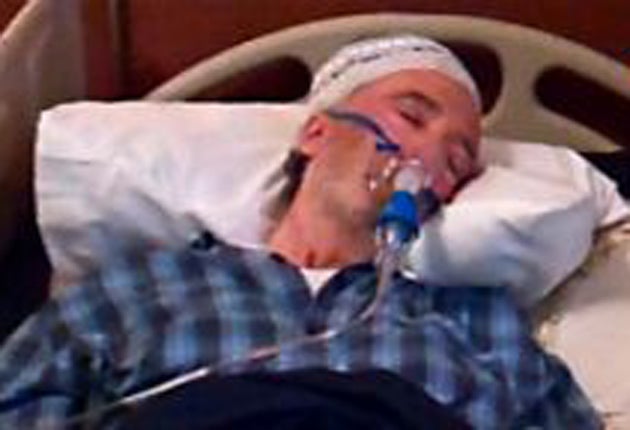Britain and US accused of playing politics with Megrahi's condition

Your support helps us to tell the story
From reproductive rights to climate change to Big Tech, The Independent is on the ground when the story is developing. Whether it's investigating the financials of Elon Musk's pro-Trump PAC or producing our latest documentary, 'The A Word', which shines a light on the American women fighting for reproductive rights, we know how important it is to parse out the facts from the messaging.
At such a critical moment in US history, we need reporters on the ground. Your donation allows us to keep sending journalists to speak to both sides of the story.
The Independent is trusted by Americans across the entire political spectrum. And unlike many other quality news outlets, we choose not to lock Americans out of our reporting and analysis with paywalls. We believe quality journalism should be available to everyone, paid for by those who can afford it.
Your support makes all the difference.The British and US governments were last night accused of ignoring the law and engaging in "international politicking" over the Lockerbie bomber, Abdelbaset al-Megrahi.
The Scottish First Minister Alex Salmond turned on the Foreign Secretary William Hague and on US senators who have repeatedly criticised the decision by his Scottish nationalist administration to free Megrahi on compassionate grounds.
He said images from Tripoli showing Megrahi in a coma and close to death underlined why he had been released in the first place and suggested that calls for his return to prison in Scotland had no legal standing.
Privately, government sources admit that they have no interest in pursuing the extradition of Megrahi despite the regime change in Libya. But they are anxious not to be seen as condoning the decision to release him. Macabre as it may be, ministers would like to see Megrahi die quickly and end the two-year controversy over his early release.
In his first public comments on the case since the fall of Tripoli, Mr Salmond welcomed the view of the Libyan transitional council that it would not consider extraditing Megrahi either to the UK or the US. "Perhaps if we all followed due process of law as the Scottish government has done and ceased the international politicking around this, then we could all be in a much better place," he said.
"The only people with any authority in this matter are the Scottish government who have jurisdiction on the matter – he is a Scottish prisoner under licence – and the new Libyan transitional council, who are the new duly constituted legal authority in Libya.
"We have never had and do not have any intention of asking for the extradition of Mr Megrahi. It's quite clear from the Libyan transitional council that following their own laws they had never any intention of agreeing to such extradition."
Mr Salmond dismissed the suggestion that Megrahi could be questioned further about the bombing, saying: "You've seen the CNN pictures as I have. I think the idea that he would be available for interview in any recognisable form is pretty far-fetched ... Mr Megrahi remains a sick man, dying of prostate cancer."
Mr Salmond said that the investigation into the bombing remained open as it had been for the past 20 years and could be helped by the regime change in Libya. "There are matters that still could be progressed on the Lockerbie bombing. The Scottish Crown Office have made it clear that if any other evidence emerges, any other people are available to give evidence, or any other indictments are possible, that they stand ready to follow these leads."
John Bolton, the former US ambassador to the United Nations, persisted with the argument for extraditing Megrahi to the US. "Personally, I think the United States made a mistake in agreeing that he be tried under Scottish law, which doesn't provide for the death penalty," Mr Bolton said.
"I don't much think of what the Scottish government thinks. I think the United States should insist that Megrahi be tried in the United States and face trial here."
Timeline
December 1988
Pan Am Flight 103 from London to New York explodes over Lockerbie. The 259 people on board the Boeing 747 are killed, as well as 11 on the ground.
November 1991
US and British investigators indict Abdelbaset al-Megrahi and Lamin Khalifa Fhimah on 270 counts of murder, accusing them of being Libyan intelligence agents.
April 1992
The UN Security Council imposes sanctions on weapons sales and air travel after Libya refuses to meet a 15 April deadline.
August 1998
Libya agrees to the two facing trial at a court in the Netherlands.
May 2000
The trial of the two begins, amid a large security operation.
January 2001
Megrahi is found guilty and jailed for a minimum of 20 years. Fhimah is found not guilty.
March 2002
Megrahi loses an appeal, heard by five Scottish judges.
August 2003
The families of the victims agree a compensation package with the Libyan government of £1.7bn.
August 2009
Megrahi is released after doctors say he has cancer and has only three months to live.
August 2011
Megrahi's brother is reported as saying that Megrahi is in a coma. Scottish government officials say his "condition is consistent with terminal cancer".
Join our commenting forum
Join thought-provoking conversations, follow other Independent readers and see their replies
Comments